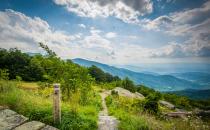COVID-19 impacts reinforce North Carolina residents’ love for public lands
A recent survey of North Carolina residents found that concerns about COVID-19 are leading to even more interest in and appreciation of in-state outdoor recreation.
The pandemic is shifting behavior of North Carolinians, who are now, sensibly, more likely to avoid crowded places, including large cities, and more likely to seek out outdoor recreation, according to the North Carolina Resident Sentiment Report conducted on behalf of Visit NC by MMGY Global Travel Intelligence.
The survey is part of a tracking study conducted to measure the ongoing impact of COVID-19 on residents.
The latest survey found that North Carolinians remain reluctant to either travel out of state or welcome out-of-state visitors, although they understand the importance of tourism to the state’s post-COVID economic recovery.
Nearly a third of respondents said they were more interested in vacationing within the state, and more than two-thirds were planning car trips — with open-air recreational spots topping the list of preferred destinations.
Even when not vacationing or taking day trips, outdoor recreation is important to North Carolina residents. The survey found that three out of five residents feel access to outdoor recreation is important — and more than 50 percent participate in outdoor recreational activities on a daily or weekly basis.
The survey found that, for recent residents, access to such activities is a major reason they choose to live in North Carolina.
“North Carolinians love the outdoors,” said SELC Senior Attorney Sam Evans. “And they understand the state and federal government’s role in maintaining and protecting the public lands that make North Carolina such a great place to live and play.”
The survey found that residents are most attracted to areas where protections for wildlife, natural areas, habitats and species are in place.
Public lands — from the Nantahala and Pisgah National Forests to the Cape Hatteras National Seashore — are core to many of North Carolina’s outdoor recreational opportunities, including hiking, mountain biking, rock climbing, kayaking, fishing, and camping. Even before the pandemic, public lands supported a 28 billion dollar outdoor recreation industry in North Carolina, which directly provides 260,000 jobs.
Protecting these places and making sure they are preserved for future generations has always been important — but the pandemic has helped even more people understand the value of public land.

